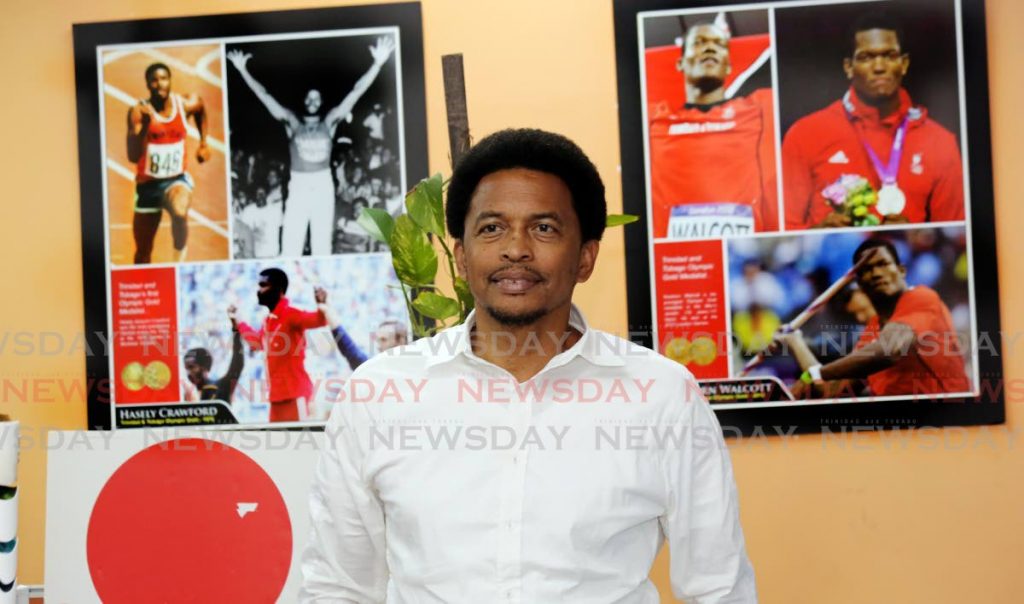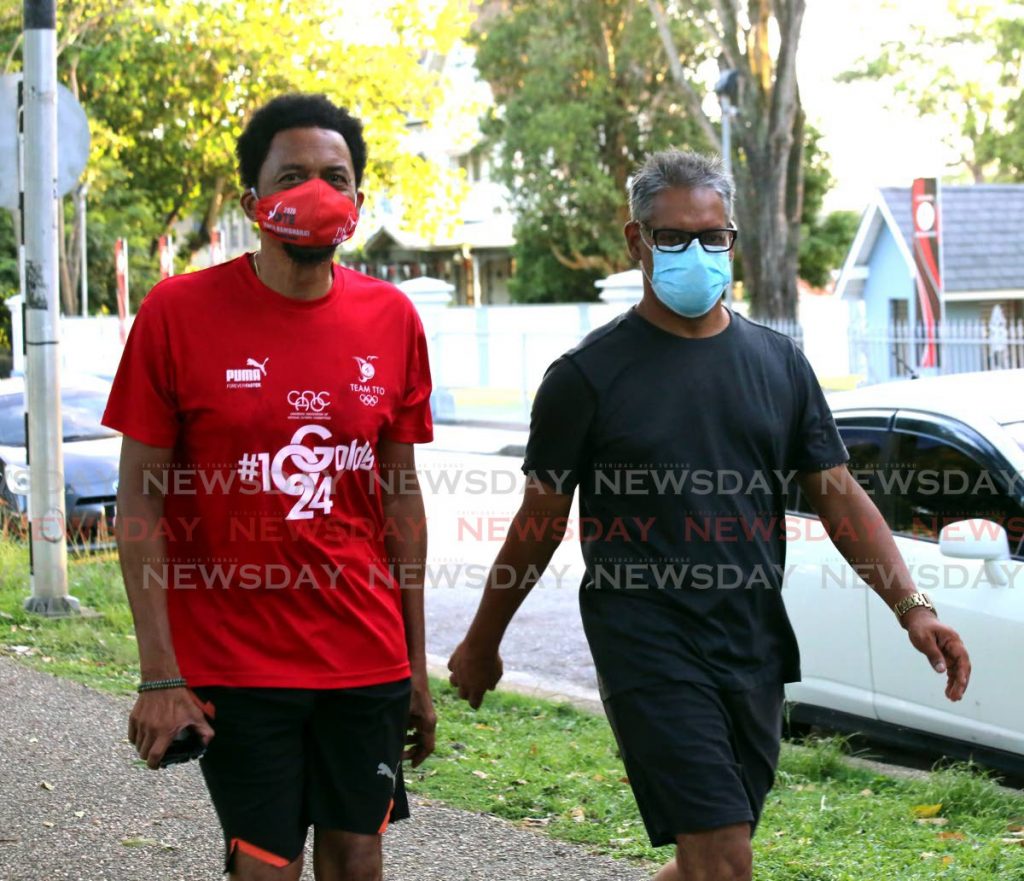Brian Lewis on how sport can drive innovation

Kiran Mathur Mohammed
kmmpub@gmail.com
With over 32 years in sports leadership, there are few people who can claim to have had the depth of influence that Brian Lewis has had over the development of Caribbean sport.
Now the president of the TT Olympic Committee (TTOC) and the Caribbean Association of National Olympic Committees (CANOC), he started out very differently, raised by a single mother in Belmont.

What was it like growing up in Belmont?
Some days it was nothing but hot water, tea and a dinner mint, and you went to sleep early.
Belmont was a hotbed of social activism. You had the the Black Power Movement and (everything revolved around) the steelbands. I used to get licks for running away to join them.
All the boys growing up had choices to make. Some were vexed at the world. But growing up, you always had a lot of sports. Sports was a big thing. You’re playing cricket.
You became aware of social issues from a young age. The British used sport to transfer their social values. But along with that, systemic racism and sexism became part of the DNA of sports.
How has your experience informed how you view social justice movements and their impact on sport?
My experience is not one that I could legitimately say is one divided by race. My best friend to this day is Ian Kalloo. So I know Ian and James Camacho – a Portuguese and an Indian from Curepe. Some of my best clients are Indo-Trinidadian.
For me the issue in TT has more to do with class than race. You come from John John you’ll be looked at differently.
The way society views women – you have sexism. I am a big advocate for gender equality. My mother is my hero. I was brought up by women and I’ve always been blessed with strong independent women. I grew up in a community where the glue is the women.
All the men are, and about, saga boys. Women bear the brunt of it. But you can shape the narrative. I’ve said the next president (of TTOC) should be a woman.
You describe yourself as an activist. But for some time now you have been part of “the establishment.” What do you say to people who would criticise your role amid the establishment?
This is a purely voluntary position. But I see how it’s easy for people to develop a chip on their shoulder.
When I was younger, my pet peeve, I used to get angry (and think), 'All of them have fathers. Why not me?'
The way you manifested and dealt with those insecurities was by being aggressive – you hid behind this façade made worse by peer pressure. It then becomes easy to rationalise choices instead of changing.
Don’t blame anybody. Take responsibility.
Sport became a surrogate father to me. From the beginning I thought that if I ever had the opportunity, I would use sport to make a difference. Sport is going to be my way to pay forward. Socially, economically: dream big and fail if you must. There’s no disgrace in failure.
What has covid19 exposed?
Covid19 has unmasked us, even as we must wear our masks. It is the great equaliser. You have to lie down in Caura like everybody else. The obstacle is that the State is still constructed along similar lines to the plantation model – that’s why we must privatise and improve access for our people. What I call the "grassroots," those opportunities are being missed.
We’re addicted to “buy low and sell high.”
They’re dumping the same imports which killed coconuts, coffee, and have stifled creative industries.
There’s no value for innovation and creativity. Look how we have treated creativity. Instead we thrive on conformity. Things that reflect society and its passion are buried. Sport is a $600 billion industry globally but we don’t recognise that potential here.
What we have done is marginalised people and put them in a box that diminishes passion. Under pressure you revert to type. Every entrepreneurial activity has risk but there is reluctance to back projects in sport – from merchandise to gyms.
Unfortunately, there are a lot of people who are complacent and making money out of the existing system.
But the genie is out of the bottle. When we’re under pressure we are creative.
How can we develop the sports industry?
When we set out to gain ten or more gold medals it was also a challenge to inspire the whole ecosystem to explore new ways to monetise sports. I’ve pushed the partnership between TTOC and the University of TT because we should have, for example, sports and exercise apps. Where are the sports drinks being made from tamarind?
We have over-invested in infrastructure, but a sports sector is deeper than that. We need software, and research on nutrition and heat on athletic performance. We could be a great winter training base.
Do you know what stopped that before? International teams were ready to set up bases, but our health facilities didn’t meet their standards. But that’s also an opportunity – we can develop and market proper orthopaedic care.
It starts with the statistics and data collection, which we don’t have. What is the real economic impact of sports? We need to start with market research.
The first customer has to be myself. I’m not that unique.
Dean Ackin (of the Tribe Carnival entertainment group) took what he wanted to see personally as a Carnival player and scaled it up. Every child must play. We need a sport venture to fund that, target entrepreneurs. We need televisits and drugs development.
Is the management structure of sport keeping us back?
Everybody’s focusing on FIFA and its organisational mechanics and forgetting completely about the big picture (of how we will innovate and develop a sports industry).
There are legitimate challenges about waste and mismanagement that we need to resolve but this is also to some extent a distraction. R&D and innovation aren’t talked about enough because we are limited by our vision of diversification. Think 50 years down the road.
What lessons can sports teach us? What advice do you have to entrepreneurs and aspiring athletes?
I’ve always been a rugby man and that taught me to bounce back quickly. It’s different from football, where you might win 2-1 and have a base for the next match. With rugby you’re starting from scratch.
Sports teaches you resilience.
If we don’t wake up, some sports are not going to survive. In a life-or-death situation sports administrators should focus on opportunities instead of spending time protesting health restrictions. How can I rebrand my sport to become part of saving lives and keeping people healthy?
It is time to change the narrative. Track and field, for example, will do well emerging from covid19 as people can still train – so sports can pivot more towards individuals.
Things like penalties teach you lessons: you can’t spend 99 per cent of your time worrying about something that will impact you one per cent.
Ask "why" a lot. Think critically. As Naipaul said, we’ve been mimic men for too long.
Sport is a microcosm, a mirror image of society. This is a defining moment. There is no “how it used to be.” Everybody wants an exception but where is the sense of personal responsibility and sacrifice? Ego is detrimental to the collective good.
But we need strategic positivity. This existential threat requires revolution, not evolution.
Focus on solutions. I try not to get distracted. Sport is a tool for development like any other. It is not a depleting asset like oil and energy.
The wealth of the people is health. Believe in yourself. In the people of your country.
Kiran Mathur Mohammed is a social entrepreneur, economist and businessman. He is a former banker, and a graduate of the University of Edinburgh

Comments
"Brian Lewis on how sport can drive innovation"